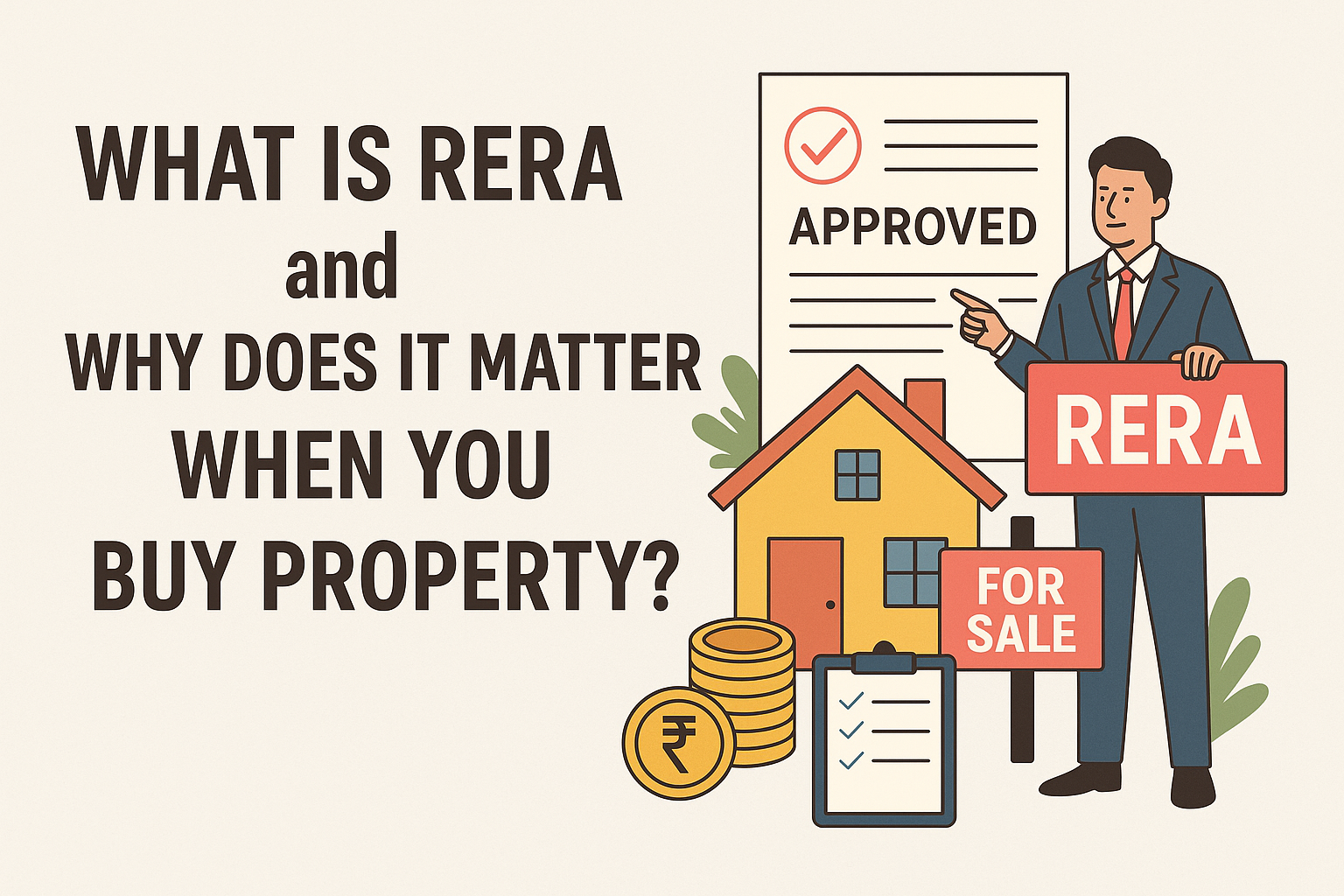If you’ve ever thought about buying a home in India, you’ve likely come across the term RERA. But what exactly is it, and why is it so important for property buyers?
In Real Estate market often clouded by delays, hidden costs, and incomplete projects, RERA stands as a game-changer. It empowers homebuyers, brings transparency, and restores trust in property transactions. In this blog, we’ll break down what RERA is, how it works, and why it should be at the top of your checklist when you’re buying your dream home.
What is RERA?
RERA stands for the Real Estate (Regulation and Development) Act, introduced in 2016 and implemented across most Indian states in 2017. The main goal of RERA is to regulate the real estate sector, ensure transparency, and protect the interests of homebuyers.
Before RERA, the real estate sector was largely unregulated, which led to frequent buyer complaints—delayed possessions, unfair pricing, false promises, and mismanagement by developers. RERA was enacted to change that and bring a sense of order and fairness to the system.
Key Features of RERA
Understanding the key highlights of RERA can help you see how it changes the home-buying experience:
1. Mandatory Registration of Projects
Every residential and commercial real estate project with land over 500 square meters or more than 8 units must be registered with the respective state’s RERA authority. Builders cannot advertise, sell, or offer a project without this registration.
2. Transparency in Project Details
All RERA-registered projects must disclose essential details such as:
- Project layout and approvals
- Timeline of delivery
- Carpet area (not super built-up)
- Financial statements
This ensures you have clear and accessible information before making a decision.
3. Timely Delivery of Projects
One of the biggest buyer pain points—delays in possession—is addressed. Under RERA, developers must stick to the declared timelines, or they must compensate buyers, including interest on the invested amount.
4. Money Management
Developers are required to deposit 70{68f39813c32799c88c386d05e9ebd4da915ef85b3bed293a5b7f068eabdf980a} of the project funds into a dedicated bank account, which can only be used for that specific project. This eliminates fund diversion and ensures smoother construction progress.
5. Penalty for False Promises
If a developer provides misleading information or deviates from the approved plans, buyers can file complaints, and the developer is liable for penalties under RERA.
6. Defect Liability Period
For five years after possession, if any structural defect or poor workmanship arises, the developer is responsible for fixing it at no extra cost to the buyer.
Why RERA Matters When You Buy Property
RERA isn’t just a legal formality—it’s your safety net. Here’s why RERA registration should be non-negotiable when buying a property:
Protects Your Investment
Buying a property is one of the largest investments you’ll make. RERA ensures your money is being used transparently and protects you from financial fraud.
Brings Accountability
Earlier, builders could delay projects without any repercussions. Now, with legal obligations, they are accountable for their commitments—be it delivery dates, quality, or pricing.
Boosts Confidence
With access to detailed project information, verified approvals, and timelines, buyers can now make informed decisions without the fear of being misled.
Legal Recourse Becomes Simpler
RERA enables a faster, more efficient redressal mechanism. Homebuyers can file complaints with the RERA Authority or Appellate Tribunal and expect timely resolution.
Fair Pricing with Carpet Area
RERA mandates that properties be sold based only on carpet area (usable area), not super built-up area. This ensures transparency in pricing and removes confusion.
How to Check if a Project is RERA Registered?
It’s easy to check if a project or builder is RERA registered. Each state in India has its own RERA website (e.g., MahaRERA for Maharashtra). You can visit the portal, search by project name, developer name, or registration number, and access complete project details.
Here are some popular RERA websites:
- MahaRERA (Maharashtra)
- GujRERA (Gujarat)
- UP RERA (Uttar Pradesh)
Pro Tip: Always Ask for the RERA Number
Whenever you consider a property, always ask the developer or agent for the RERA registration number. Verify it online before proceeding. If a builder refuses or delays sharing it, it’s a red flag.
RERA: A Step Towards a Safer Real Estate Market
Whether you’re a first-time homebuyer or a seasoned investor, RERA has reshaped the real estate landscape for the better. It brings transparency, security, and accountability—everything a buyer needs to make a smart, stress-free investment.
If you’re exploring properties, especially in cities like Mumbai, Pune, or Bangalore, always prioritize RERA-registered projects. It’s your legal protection and a sign of a trustworthy builder.
Final Thoughts
In a sector that once heavily favored developers, RERA puts the power back in the hands of the buyer. It’s not just a regulation—it’s a revolution in how property transactions are handled in India. As a homebuyer, knowing your RERA rights and checking for project compliance ensures you invest in peace of mind, not just property.
If you’re planning to Buy Property — whether it’s your first home or an investment—choosing a RERA-registered project is the smartest decision you can make for long-term security and transparency.

